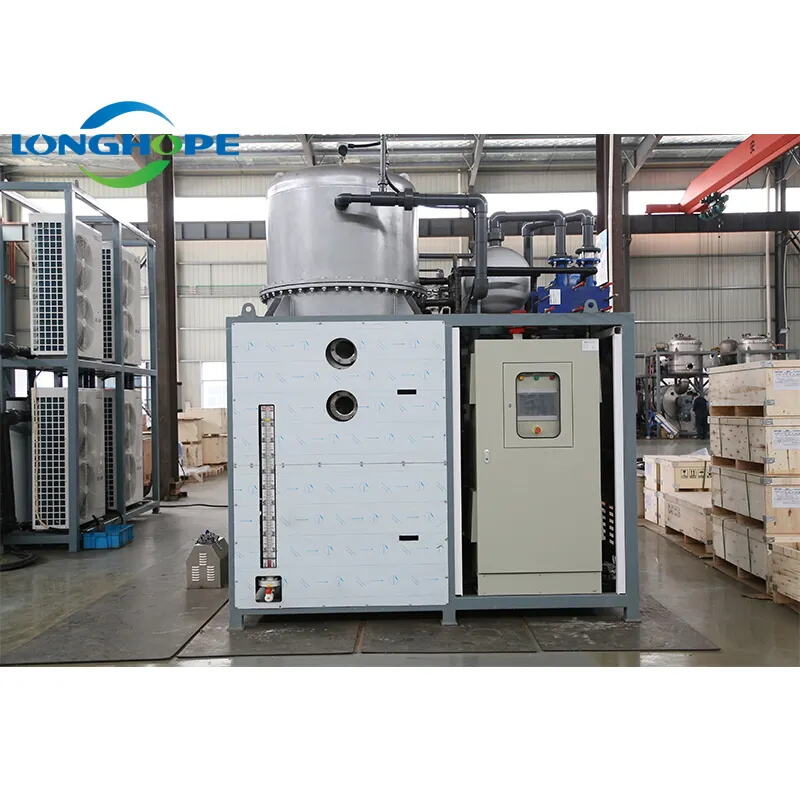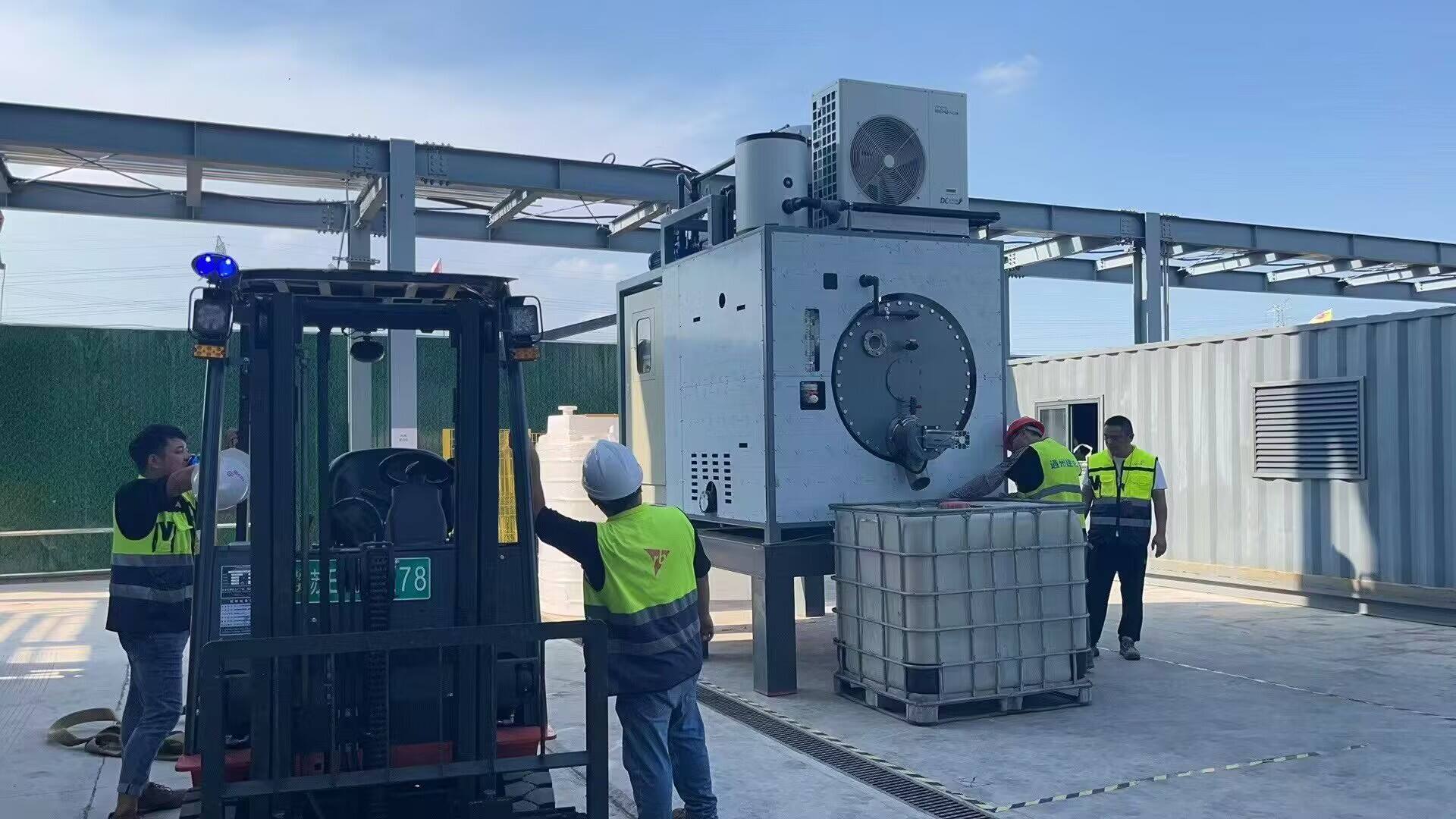Industriālās apstrādes pārveidošana ar modernu kristalizācijas tehnoloģiju
Mūsdienu konkurētspējīgajā ražošanas vides kontekstā pareizas kristalizatora mašīna izvēle var ievērojami ietekmēt jūsu ražošanas efektivitāti un produkta kvalitāti. Šie sarežģītie aprīkojuma veidi ir būtiski daudzās nozarēs, sākot no farmaceitiskās un ķīmiskās rūpniecības līdz pārtikas apstrādei un citām. Svarīgi ir izprast kristalizatoru mašīnu nianses un to pielietojumu, lai pieņemtu informētu ieguldījumu lēmumu, kas atbilst jūsu uzņēmējdarbības mērķiem.
Kristalizācijas process pats par sevi ir gan māksla, gan zinātne, kas prasa precīzu kontroli pār dažādiem parametriem, lai sasniegtu optimālus rezultātus. Mūsdienu kristalizatoru mašīnas apvieno jaunākos tehnoloģiskos sasniegumus ar pārbaudītiem principiem, nodrošinot stabili augstas kvalitātes kristālu produktus. Vai nu vēlaties modernizēt esošo iekārtu vai investēt savā pirmajā kristalizatora mašīnā, šis visaptverošais ceļvedis palīdzēs jums droši orientēties izvēles procesā.
Rūpniecisko kristalizatoru mašīnu būtiskās īpašības
Temperatūras regulēšana un siltuma pārneses sistēmas
Katru kristalizatora mašīnas sirdi veido tās temperatūras regulēšanas iespējas. Avancēti dzesēšanas un apkures sistēmas nodrošina precīzu temperatūras regulēšanu visā kristalizācijas procesā. Mūsdienu iekārtās ir sarežģīti siltummaini, kas uztur optimālus apstākļus kristālu veidošanai un augšanai. Efektīvākās sistēmas ietver vairākas temperatūras zonas un automātiskās vadības elementus, lai panāktu vienmērīgus rezultātus dažāda apjoma partijās.
Digitālās temperatūras uzraudzības un vadības sistēmas ir pārveidojušas kristalizatora mašīnu darbību. Šīs sistēmas nodrošina reāllaika datus un ļauj veikt precīzas korekcijas, lai sasniegtu vēlamās kristālu īpašības. Spēja uzturēt stabīlus temperatūras gradientus ir īpaši svarīga jutīgās lietošanas jomās, piemēram, farmācijas un smalko ķīmisko vielu ražošanā.
Maisīšanas un agitācijas mehānismi
Maisīšanas sistēma kristalizatora mašīnā tieši ietekmē kristālu izmēru sadalījumu un vienmērīgumu. Mūsdienīgi maisītāji ir izstrādāti, lai nodrošinātu maigu, bet rūpīgu maisīšanu, nesabojājot vieglos kristālu struktūras. Maināmā ātruma regulēšana ļauj operatoriem pielāgot maisīšanas intensitāti atkarībā no konkrētajām produkta prasībām un procesa stadijām.
Izsmalcinātās kristalizatora mašīnas bieži aprīkotas ar speciāliem maisītāja diskiem, kas optimizē plūsmas modeļus un minimizē mirto zonas. Tas nodrošina vienmērīgu pārsātinājumu visā šķīdumā, kas veicina vienveidīgāku kristalizāciju. Dažādu maisīšanas mehānismu izvēlei jābūt balstītai uz jūsu produkta specifiskajām īpašībām un vēlamajām kristālu raksturojumiem.

Kristalizatora mašīnu tipi un to Lietojumi
Partijas kristalizatori
Partijas kristalizatori joprojām ir populārs izvēles veids daudzās nozarēs, jo tie piedāvā daudzpusību un kontroles iespējas. Šie sistēmas izcili darbojas lietojumprogrammās, kurās bieži nepieciešamas produktu maiņas vai nelielas ražošanas partijas. Partijas process ļauj precīzi kontrolēt katru kristalizācijas posmu, tādējādi to padarot par ideālu augstas tīrības kristālu ražošanai.
Mūsdienu partijas kristalizatoru mašīnas ietver modernas automatizācijas funkcijas, kas samazina operatora iejaukšanos un nodrošina vienmērīgumu starp partijām. Tās īpaši labi piemērotas farmaceitiskajām lietojumprogrammām, kur produkta izsekojamība un partiju dokumentācija ir būtiski nosacījumi.
Nepārtrauktas darbības kristalizatori
Lielapjomu ražošanas scenārijiem nepārtrauktas darbības kristalizatoru mašīnas piedāvā ievērojamas priekšrocības. Šīs sistēmas nodrošina stabilu darbību un pastāvīgu produkta kvalitāti ilgstošās ražošanas laikā. Nepārtrauktais process samazina darbaspēka nepieciešamību un salīdzinājumā ar partiju procesiem var novest pie ievērojama enerģijas ietaupījuma.
Pēdējās inovācijas nepārtrauktā kristalizācijas tehnoloģijā ir ieviesušas uzlabotas vadības sistēmas un reāllaika uzraudzības iespējas. Šie sasniegumi padara nepārtrauktus kristalizatorus aizvien pievilcīgākus lietojumiem, kuros nepieciešama precīza daļiņu izmēru sadalījuma kontrole un augsti caurlaides ātrumi.
Faktori, kas ietekmē kristalizatora mašīnas izvēli
Ražošanas jaudas prasības
Pareizas kristalizatora mašīnas izmēra noteikšana sākas ar rūpīgu analīzi par jūsu ražošanas vajadzībām. Jāņem vērā ne tikai pašreizējās prasības, bet arī potenciālā nākotnes paplašināšanās. Izvēlētajai sistēmai jānodrošina pietiekama jauda, nevis pārmērīga palielināšana, kas var izraisīt operacionālas neefektivitātes un nevajadzīgas kapitāla izmaksas.
Mūsdienu kristalizatoru mašīnas piedāvā dažādas ietilpības robežas un spēju risināt mainīgas ražošanas vajadzības. Daži sistēmas modeļi ir modulārā konstrukcijā, kas atvieglo nākotnes jaudas paplašināšanu, vienlaikus saglabājot darbības efektivitāti dažādos ražošanas apjomos.
Materiālu savietojamība un konstrukcija
Jūsu kristalizatora mašīnas būvmateriāliem jābūt savietojamiem ar jūsu procesa materiāliem un ekspluatācijas apstākļiem. Augstas kvalitātes nerūsējošais tērauds joprojām ir standarts daudzām lietojumprogrammām, taču korozīviem vai augstas tīrības pakāpes pielietojumiem var būt nepieciešami speciāli materiāli.
Ņemiet vērā mašīnas virsmas pārklājumu un tīrīšanas prasības, jo īpaši farmaceitiskiem un pārtikas rūpniecības pielietojumiem. Mūsdienu kristalizatoru mašīnas bieži aprīkotas ar CIP (Clean-in-Place) sistēmām un materiāliem, kas atbilst stingrām regulatīvajām prasībām.
Apkopes un ekspluatācijas apsvērumi
Preventīvās apkopes prasības
Regulāra tehniskā apkope ir ļoti svarīga, lai nodrošinātu kristalizatora mašīnas optimālu veiktspēju un ilgu kalpošanas laiku. Mūsdienu sistēmas iekļauj funkcijas, kas atvieglo apkopi, piemēram, pieejamos komponentus un vienkāršotas tīrīšanas procedūras. Apkopes prasību izpratne palīdz plānot pārtraukumus darbībā un aprēķināt kopējās īpašuma izmaksas.
Lauktrešu mašīnās iebūvētās modernās uzraudzības sistēmas var paredzēt apkopes vajadzības un brīdināt operatorus par potenciālām problēmām, pirms tās kļūst kritiskas. Šīs prediktīvās apkopes iespējas palīdz minimizēt negaidītos darbības pārtraukumus un optimizēt apkopes grafikus.
Energoefektivitāte un ekspluatācijas izmaksas
Enerģijas patēriņš veido būtisku daļu no kristalizatora mašīnu ekspluatācijas izmaksām. Mūsdienu konstrukcijās iekļautas enerģijas taupīgas funkcijas, piemēram, uzlabota izolācija, siltuma atgūves sistēmas un optimizēti dzesēšanas kontūri. Dažādu modeļu enerģijas efektivitātes novērtējums var palīdzēt identificēt vispiemērotāko risinājumu jūsu darbībai.
Ņemiet vērā kopējās īpašuma izmaksas, tostarp enerģijas patēriņu, uzturēšanas prasības un ekspluatācijas darba vajadzības. Dažas kristalizatora mašīnas var būt dārgākas sākotnēji, taču piedāvā ievērojamas ietaupījumus, samazinot enerģijas patēriņu un uzturēšanas prasības.
Bieži uzdotos jautājumus
Cik ilgs laiks nepieciešams, lai uzstādītu un nodotu ekspluatācijā jaunu kristalizatora mašīnu?
Uzstādīšanas un nodošanas ekspluatācijā laiks atkarīgs no sistēmas lieluma un sarežģītības parasti svārstās no vairākām dienām līdz vairākām nedēļām. Tas ietver aprīkojuma uzstādīšanu, komunālo pakalpojumu pieslēgumus, vadības sistēmas integrāciju un operatoru apmācību. Sadarbība ar pieredzējušiem piegādātājiem palīdz nodrošināt gludu uzstādīšanu un palaišanu.
Kādi ir galvenie kristalizatora mašīnu uzturēšanas punkti?
Regulāra apkope koncentrējas uz vairākām kritiskām jomām, tostarp siltuma apmaiņas virsmām, maisīšanas sistēmām, blīvēm un instrumentu aprīkojumu. Tīrīšanas grafiki, riepas eļļošana un vadības sistēmu kalibrēšana ir būtiskas apkopes darbības. Konkrētie nosacījumi ir atkarīgi no mašīnas tipa un ekspluatācijas apstākļiem.
Kā es varu optimizēt kristālu izmēru sadalījumu savā procesā?
Kristālu izmēru sadalījumu var optimizēt, rūpīgi kontrolējot ekspluatācijas parametrus, tostarp temperatūras profilus, pārsātinājuma līmeņus un maisīšanas apstākļus. Mūsdienu kristalizatoru mašīnas piedāvā modernas vadības sistēmas, kas palīdz uzturēt optimālus apstākļus vēlamajām kristālu īpašībām. Sadarbojoties ar pieredzējušiem piegādātājiem, iespējams izstrādāt specifiskus protokolus Jūsu lietojumprogrammai.

